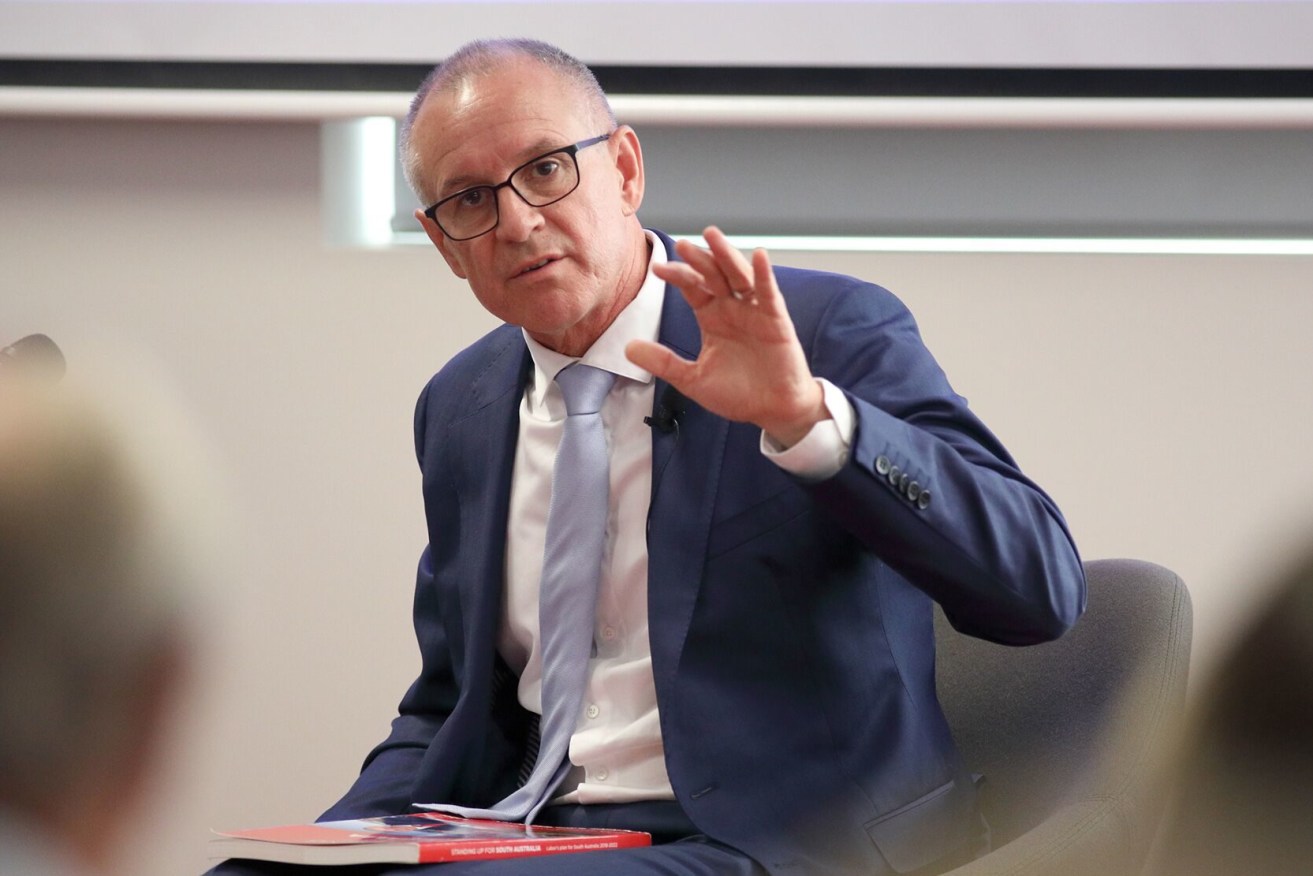Campaign Diary: Rust belt politics
Today, Jay Weatherill explains the rise of Nick Xenophon, more details of the sub-campaign on pokies, new poll numbers raise as many questions as they answer, and a pro bono justice service claims a pre-election win.


Premier Jay Weatherill at our forum on Friday. Photo: Tony Lewis/InDaily
It’s the economy…
My research suggests that Rust Belt populism is rooted in the region’s loss of locally owned industry — not simply because of economics but because of how that loss hollowed out the community structure that once connected people to politics, leaving residents alienated and resentful. – John Pacewicz in The Washington Post
There are many aspects of the Pacewicz analysis, written in the aftermath of the 2016 Presidential election and mentioned above, that resonate in South Australia.
There’s also this: “Instead of seeing politics as a contest between working people and the business class, many voters seethed with undirected populist resentment at a technocratic, corporate-friendly elite.”
In the final of InDaily’s leaders’ forums, recorded on Friday night, we asked Premier Jay Weatherill to explain the rise of Nick Xenophon and an increasing disaffection with the mainstream political parties.
He started with a general observation: “The world is in fragments now and it’s unsurprising that the political alliances would also be in fragments. I just think this is the modern condition.”
While Weatherill said he had tried to restore people’s faith in politics through his “participatory democracy” measures – such as citizen’s juries and the “fund my community” initiatives – we asked why this didn’t prevent the fragmentation of voting intentions.
He put that down to economic problems – the economic “transformation” of South Australia and the “massive threat” that posed to jobs: the loss of “jobs for life”, the casualisation of the workforce and other changes.
“All of these disruptions that are occurring as a consequence of this change in economic activity causes people to feel upset and angry,” he said. “And, of course, they’re going to reflect some of that on government.”
Naturally, he doesn’t believe that Steven Marshall’s Liberals have persuaded the community of its alternative program – a “vacuum” that he says led to Xenophon seizing an opportunity to try to stake a claim to Lower House seats.
Listen to a snapshot of the interview here.
Meanwhile, in a rust belt pub near you…
Several pieces of research and analysis over the years has shown that poker machines hit poorer suburbs the hardest.
Average losses per gambler in South Australia are estimated to be more than $2300 per year.
That lost money, according to the Australian Hotels Association and the SANFL, is being well spent on supporting jobs and local football clubs – which is why both organisations are campaigning hard.
SA Best wants to limit bets and cut the number of poker machines in SA by half, while the Greens want to abolish poker machines altogether.
Labor has overseen a painfully slow reduction in the number of machines, while the Liberals support the status quo. Both major parties, and the Australian Conservatives, have enjoyed donations from the AHA.
The debate flared on the weekend, with Xenophon being joined by anti-pokies activists from interstate and the SA Best leader again accusing the AHA of have “‘sucked in’ some of the state’s sporting and community not-for-profit clubs with pokies, to spread its scaremongering smear campaign”.
The attention was also directed to the SANFL and some individual clubs who are warning members that anti-pokies policies could threaten their clubs’ future.
SANFL president John Olsen, also happens to be the president of the Liberal Party, but he assures InDaily he has not been involved in the pro-pokies campaign.
“I’ve not been party to any discussions between the SANFL and the clubs and their campaign,” he said.
“I’ve excused myself from any discussion so there’s no conflict of interest.”
Meanwhile, AHA boss Ian Horne has rejected suggestions from Xenophon that his organisation is spending millions of dollars on its widespread “No Way Nick” campaign.
He told ABC radio today that the total spend wasn’t “anywhere near” $1 million and was “south” of $750,0000.
Seat-based polls raise more questions
The Advertiser’s latest collection of individual seat polls does little to erase uncertainty about Saturday’s result.
For example, the Galaxy-YouGov poll of Hartley shows SA Best leader Nick Xenophon on 30% of the primary vote behind incumbent Liberal Vincent Tarzia on 38%, with Labor’s Grace Portolesi on 22% – but the way preferences will fall is anyone’s guess.
The pollsters claim this translates into a 51-49 two-party preferred vote, in Tarzia’s favour. Without a strong flow of preferences, Xenophon can’t win, the reasoning goes, particularly given the Conservatives and Greens have preferenced Tarzia over Xenophon and Labor is running an open ticket.
But it seems a big presumption that Labor and Green voters (5% of the primary) would preference the Liberal candidate in higher numbers than Xenophon.
A ReachTel/Channel Seven poll last November had the parties on a not too dissimilar primary vote (Liberal 36.4, SA Best 29.3 and Labor 20.7) and had Xenophon leading 53-47 after preferences.
Xenophon remains a fighting chance.
Other polls showed Labor just in front of SA Best in the heartland northern suburbs seat of Taylor (51-49), Labor minister Leon Bignell absolutely line-ball in Mawson (notionally a Liberal seat after a redistribution) and Liberal leader Steven Marshall leading Labor 53-47 in Dunstan.
JusticeNet claims pre-election win
A local service which coordinates pro bono legal advice for disadvantaged South Australians is claiming a pre-election win.
In an email to supporters today, JusticeNet said most political parties had pledged to continue support for the service.
Labor, the Greens, SA Best and the Dignity Party all supported state funding, while the Liberals said it would review the funding formula for the service should they win government.




